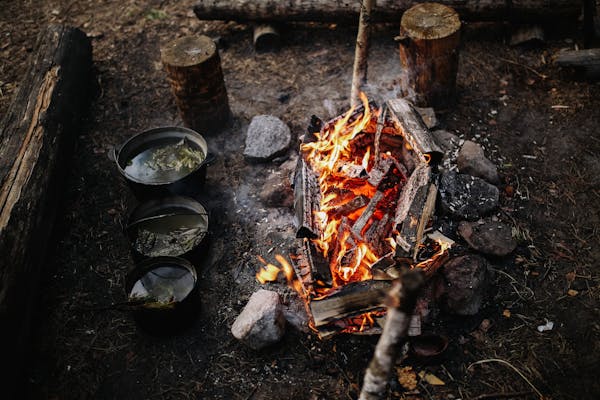Take a weekend survival bushcraft course and learn the essential skills needed for wilderness survival. Build shelter, make fire, purify water and find food using the natural signposts nature provides you with.
Other classes include a Wild Medicine and Edible Plants class, a flint and steel bow making class or the nine-month Wilderness Survival Immersion program.
Basics
You will learn the basic survival skills that are necessary to sustain you in the wilderness should you find yourself lost or facing a life-threatening situation. These essential skills include lighting fires, identifying edible plants, building shelters, purifying water and safely preparing rabbit, fish and birds. This Level 2 Bushcraft, Survival and Wilderness Living Skills course is accredited by the NCFE and is designed as a fun and hands-on learning experience rather than an endurance challenge.
Courses like this can be great for those new to camping or hiking who want to understand their environment and the basics of survival skills. They go above and beyond a standard camping experience by providing lessons in fire lighting, plant identification, shelter construction and safe knife use. Many participants have found these courses to be a gateway into learning a wider range of wilderness skills. Some even take a series of these courses to fully immerse themselves in the backcountry. Check out Bushcraft for Schools for more info!
Shelter
Shelter is one of the unsung heroes of survival – it requires far less calories to create and maintain than fire yet it provides crucial protection from wind, rain and snow.
Often a good shelter can be found simply by looking around. Hollows, caves and sheltered knolls are all potential options. The key is to look for locations that are out of the prevalent wind direction, free from flammable materials (e.g. Giant Hogweed) and close to a source of water.
The next step is to find a frame that can be covered with material to provide the four essential components of a shelter: waterproofing, fire resistance, insulation and windproofing. Traditionally grass or cattail thatching was used to build shelters but bark slabs from dead trees – especially cottonwood, birch and poplar – are also popular. Lastly a tarp can be used to provide a waterproof cover that is easy to set up and will protect from rain, snow, and light showers.
Water
Whether you want to travel and live abroad, hunt and fish, or just connect with nature on wilderness expeditions, this course equips you with the skills to thrive in any environment. Develop an in-depth understanding of nature, cultivate your wilderness survival skills and build a sturdy campsite too.

The first of our ‘go anywhere’ fundamentals, water is the most important thing to keep in good supply when travelling in the wild. You’ll learn to find water in a range of environments and terrains, as well as how to make it safe to drink using a variety of methods.
This course is designed to be immersive, and you will spend the week learning practical techniques that will allow you to survive in the wilderness with minimal reliance on equipment. It will prepare, challenge and inspire you in equal measure.
Food
The course offers a complete immersion into the ‘go anywhere’ fundamental skills-sets of wilderness survival. It is designed to ease any apprehension about living and travelling in the wild by gradually replacing it with knowledge, understanding and capability.
Working from an expedition-style base camp in mixed broadleaf and coniferous woodland, the skills taught on the course are all applicable to any wilderness travel scenario. You will learn a variety of woodcraft techniques, primitive fire lighting methods including match, zirconium and bow drill, and how to construct the basic open front lean-to.
You will also learn about animal hides, brain tanning and make a backcountry axe. The food prepared over the campfire is both nutritious and delicious – and, of course, all made from wild ingredients. This is one of our most popular courses and is ideal for anyone with an interest in survival, primitive skills, outdoors or wilderness travel. Suitable for a wide range of learners, including those working in outdoor education centres, schools and FE colleges as well as for bushcraft enthusiasts.